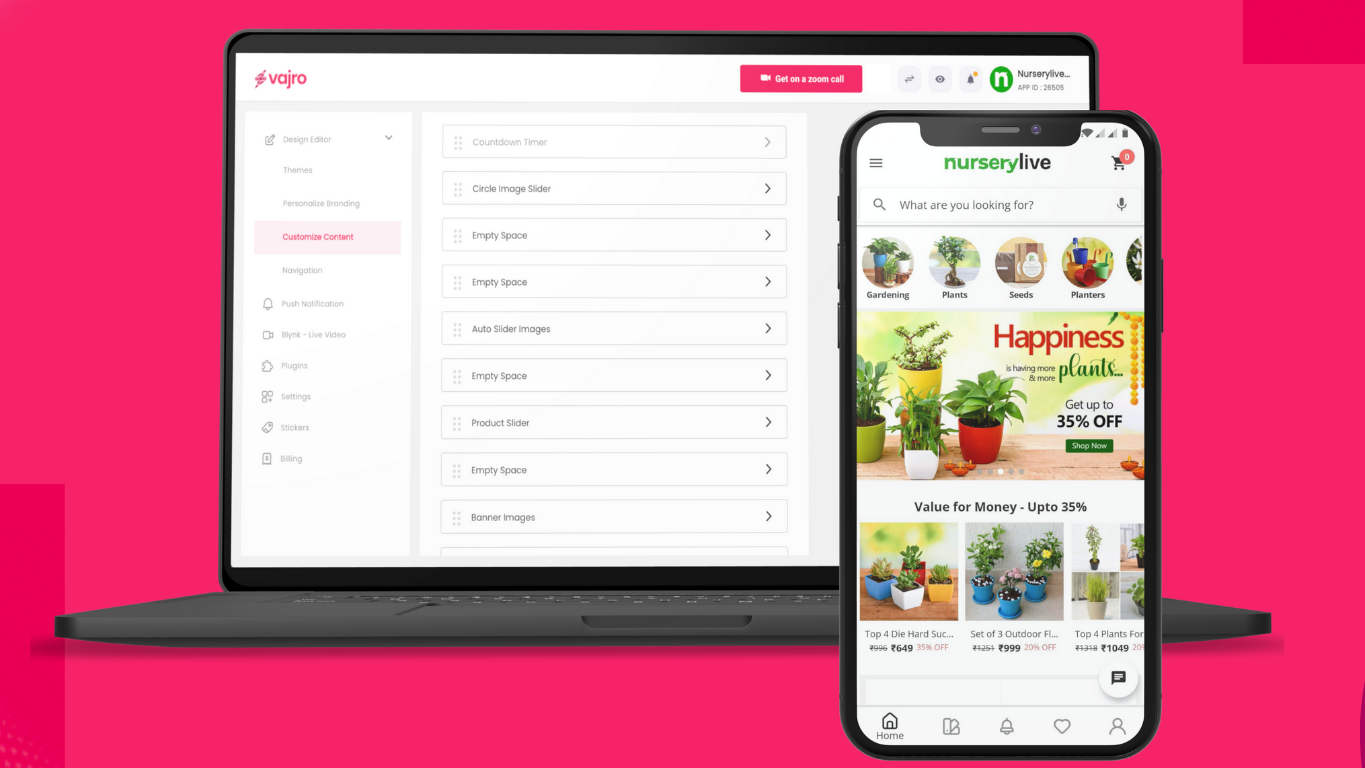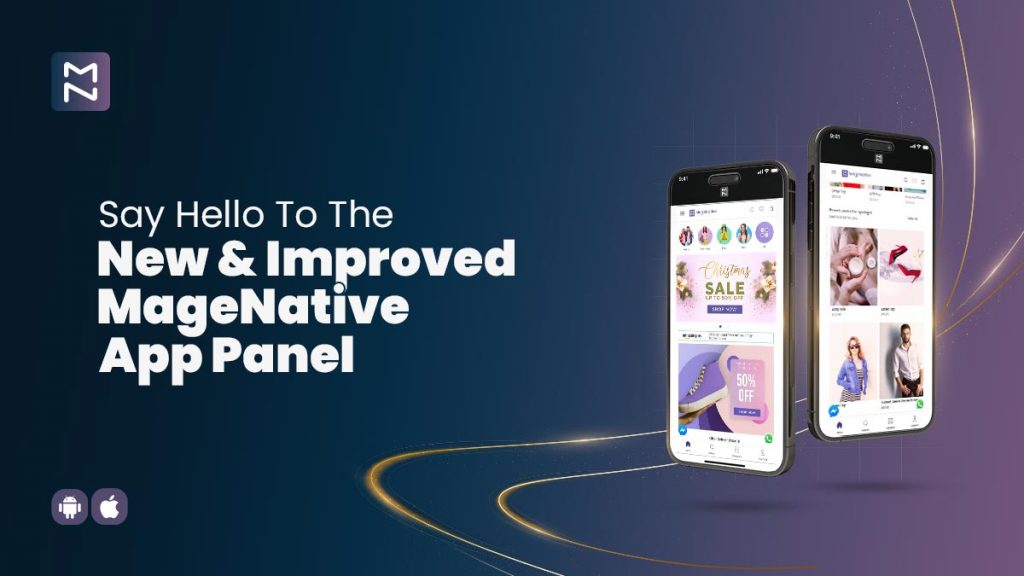
As the ecommerce industry continues to grow year after year, it’s becoming increasingly important for online businesses to have a strong presence on mobile devices. With more and more people using their smartphones and tablets to shop, having a mobile app for your Shopify store can give you a competitive edge and improve your overall customer experience.
Luckily, Shopify offers a variety of mobile app builders that allow Shopify store owners to easily create and manage their own mobile apps. In this article, we’ll take a look at some of the best Shopify mobile app builders that will help you take your store to the next level in 2024.
Compared to native app development, Shopify app builders let you launch iOS and Android apps in a fraction of the time, and at a cost that most online store owners can afford.
To help narrow your search, here are ten Shopify mobile app builders to consider for launching your own Shopify iOS and Android apps.
Apptile is the fastest growing no-code mobile app builder on Shopify. Apptile’s innovative no-code builder enables businesses of all sizes to easily create highly customized apps that boost sales, drive retention, and build a loyal base of customers.
Key Features and Impact:

Pros:
Cons:
Apptile is essential for any Shopify store looking to expand its mobile presence. Its easy-to-use platform, powerful AI features, and comprehensive Shopify integrations make it a standout choice for anyone looking to build a stunning mobile app.
Power your mobile strategy with Apptile. Visit Apptile’s website to start building your app today.
MobiLoud is one of the top mobile app builders to build mobile apps for your Shopify store.
MobiLoud is not just a template-based app builder. It converts your entire site, including all plugins, Shopify apps, themes, and any other functionality, to iOS and Android apps.
Everything that already works for you on your mobile website will work out of the box, for both your Android mobile app and iOS mobile app.
Best of all, your apps and website are 100% synced. You make changes to your site, your apps update as well. This makes it not only the easiest way to launch a mobile app, but the easiest to maintain long-term.
Setup is fast and pain-free. You’ll configure a few things, like mobile-specific design elements (menus, navigation, splash screens), and push notification settings. The MobiLoud team handles the rest, including all the heavy lifting under the hood.
MobiLoud also provides ongoing support, for updates, maintenance and any changes to your apps in the future. This is more than you’ll get from almost any other app builder out there.
What you get with MobiLoud is 95% of what you’d get from coding a native app from scratch, at a mere fraction of the cost, time and complexity. Best of all, you’ll retain everything that makes your mobile website great.
Tapcart is another popular choice for Shopify store owners looking to create a mobile app. With its easy-to-use drag and drop interface, Tapcart allows you to create a fully customized mobile app in minutes. It also offers features such as push notifications, loyalty programs, and integration with social media platforms. One of the biggest advantages of using Tapcart is its ability to integrate with other Shopify apps, giving you access to a wide range of features and functionalities.

One example of a successful brand that has used Tapcart is fitness apparel company, Gymshark. By using Tapcart, Gymshark was able to create a visually appealing mobile app that offered a seamless shopping experience for their customers. This resulted in increased customer engagement and retention, as well as improved conversion rates.
Tapcart is powerful, but pricey. It starts at $250 per month, which is affordable, but this plan offers very limited features. You’ll likely need the next level up, at $550 per month, or even to the Tapcart Enterprise plan, starting at $1,200 per month.
Plobal Apps is a popular choice among Shopify store owners looking to create a mobile app. By integrating with your Shopify store, Plobal Apps automatically syncs all of your products, collections, and customer data. It also offers a variety of customization options such as themes, colors, and fonts to match your brand’s aesthetic. In addition, Plobal Apps allows you to send targeted push notifications to customers based on their browsing and purchasing behavior, helping you to increase customer engagement and loyalty.
One notable brand that has successfully used Plobal Apps is luxury fashion brand, Rebecca Minkoff. By using Plobal Apps, Rebecca Minkoff was able to create a mobile app that offered a seamless shopping experience for their customers, resulting in increased sales and customer retention.
On the surface, the cost is not as daunting as Tapcart. But they charge an additional “success fee”, which ranges from 1-3% of your app sales, which adds up as you scale.
Vajro is a template-based app builder, which boasts that it lets you launch a mobile app in less than 60 minutes, without coding. They offer four themes to start with, as well as a drag-and-drop builder. It’s certainly easy to use – but some will find themselves wanting more power. It uses integrations to link up with apps, third-party tools, supporting over 70 integrations – a lot more than Tapcart and Plobal Apps.

One brand that has leveraged Vajro’s services is jewelry company, Kendra Scott. By using Vajro, Kendra Scott was able to create a visually stunning mobile app that offered an easy and convenient shopping experience for their customers. This resulted in a significant increase in sales and customer satisfaction for the brand.
Their lowest plan is affordable at $99 per month, but most stores will find the feature set lacking (it only offers 30 push notifications, for example). You may need to upgrade to $199-$399 per month, which is a little expensive for a templated app builder.
The Appmaker mobile app builder is similar to most of the Shopify app builders on this list. You’ll build the interface with a visual editor, and sync the backend to your Shopify store.
It’s not the most sophisticated app builder, but it’s easy to use. Appmaker supports many payment gateways – from major credit cards to Apple Pay, Amazon, PayPayl, Klarna and more – but overall, the integrations are lacking compared to other tools.
Appmaker is a decent fit for stores with simple needs, and no need to integrate any complex features or functionality.
Shopney is a dependable option, offering a little more flexibility for designing your app layout compared to similar template-based app builders.

Smaller stores may find Shopney is a good entry-level option to mobile apps, offering a $99 per month plan, which includes most core features. However, you’ll need to upgrade to the next level up to get features like Abandoned Cart notifications and scheduled push notifications. And some integrations – Klaviyo, for example – are only available on the $499/mo “Platinum” plan level.
The selling point of Jcurve is the price, starting at $89 per month for a very simple feature set. And though you’ll likely need the $139/mo option (required for any decent integrations, as well as Abandoned Cart notifications), this is still more affordable than most alternatives.
A low price point does mean making sacrifices. It’s not as powerful as other app builders. The integrations are limited, and their support is questionable. Still, it may be a good fit for low-level stores just looking to get their feet wet with mobile apps.
MageNative offers another interesting option for stores looking for an app builder at a lower price point.
It starts as low as $49/mo – though realistically you’ll need to go at least one level higher to get enough features to make it worthwhile. Yet even their highest plan is cheaper than just about any other from this list.
At the end of the day, it’s still a template-based app builder, and you’re reliant on what they give you in terms of design and integrations. They don’t have as many direct third-party app integrations either, which may be tricky. But for a budget option, it’s a great pick.

Mowico is an no-code app builder designed for building ecommerce mobile apps for stores on many different platforms – WooCommerce, BigCommerce, PrestaShop, Weebly and many more, along with Shopify.
Whatever your platform, it integrates with the backend while providing the tools to build your customer-facing app using a no-code app builder and a range of apps and widgets.
The tradeoff for this is that, not being built specifically for Shopify, the integration is not as seamless as with other tools.
The widgets and integrations may also make it tough to recreate what you have on your existing website. They can provide custom integrations or features, but this may get expensive (you need to contact them to get a quote for this).
Wrapping Up – The Best Mobile App Builders for Shopify Stores
In this post, we’ve shown the best mobile app builders for Shopify store owners. These tools make it simple for any store owners to launch their own native Android and iOS apps.
It’s simple to set up – everything works out of the box, including push notifications, as well as your existing checkout and product collections. And best of all, it’s easy to keep your iOS app, Android app and mobile website maintained and in sync, long-term.
Enhance Your Mobile Customer Experience with Apptile
Elevate your e-commerce success with an exceptional mobile CX. Apptile specializes in crafting personalized, engaging mobile interactions that boost customer loyalty. Our platform is designed for e-commerce businesses seeking to captivate and delight both new and returning shoppers. Ready to transform your mobile strategy? Contact Apptile now and let’s make your customer experience extraordinary.